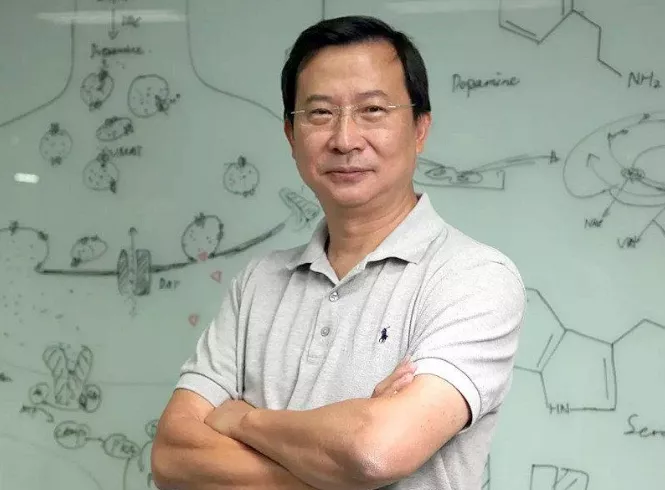
2013 年,中科院神经科学研究所研究员杨辉以第一作者身份于《细胞》(Cell)发表题为“One-Step Generation of Mice Carrying Reporter and Conditional Alleles by CRISPR/Cas-Mediated Genome Engineering”的论文,报告了一种利用 2 个 Cas9 mRNA 和 2 个 sgRNA、通过“双供体”法创建转基因小鼠的新技术,并表示该技术条件敲除等位基因的效率高达 16%,相较其他方法有明显提升,在业内引发震动。
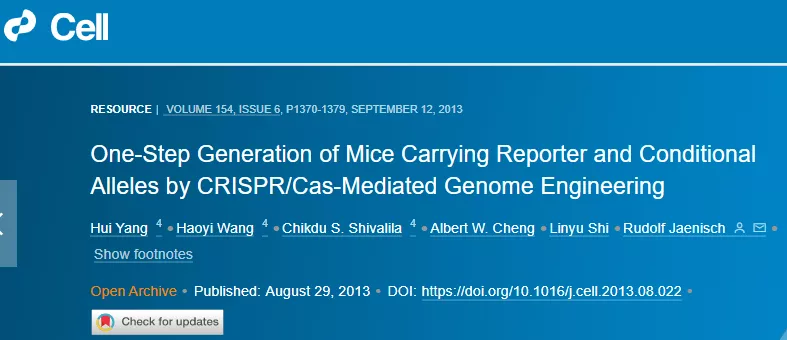
6 年后的2019年,来自全球 七个国家、三十几个大学、逾百位科学家联合发表论文(美国内布拉斯加大学教授 Channabasavaiah B. Gurumurthy 为第一作者),指出根据杨辉等人 2013 年提出的双供体法进行重复后,无法复现其 16% 的成功率。
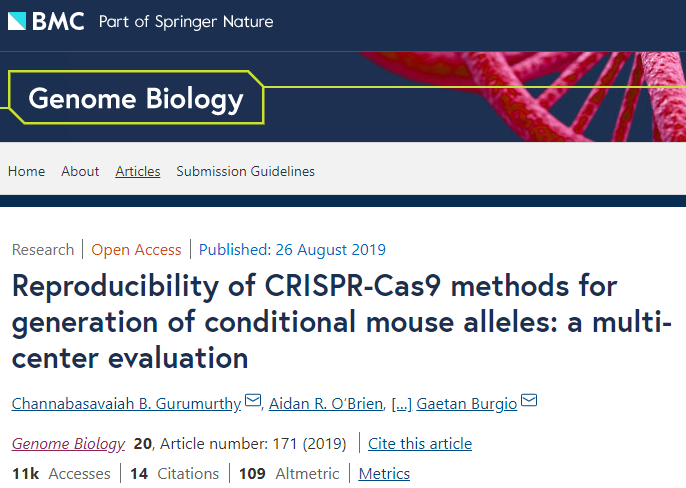
2021 年 4 月 7 日,杨辉等通过 Genome Biology 发文回复上述质疑,指出已有其他团队可成功重复该方法,效率从 2.5% 到 18% 不等。还表示:重复实验时的方法以及试剂浓度都不同,导致了实验无法重复。
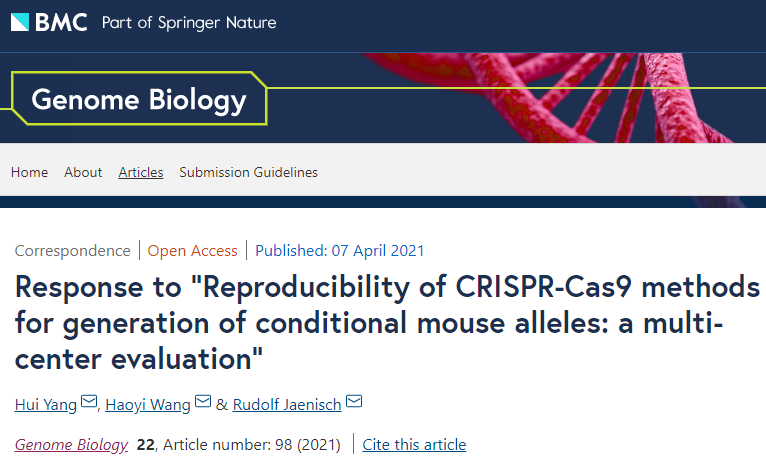
同日(4月7日),Gurumurthy 等人随即回应杨辉,指出:合作团队内的所有实验室都没人能达到 16% 的效率,而且 2013 年的 Cell 论文没有公布试剂的使用浓度等细节,曾经尝试联系作者但未得到回应。
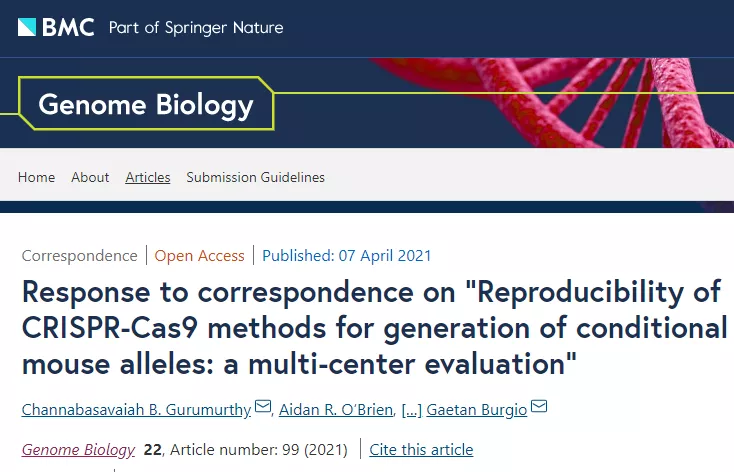
4月9日,首都医科大学校长饶毅在其个人公众号“饶议科学”发表署名“活见久”,题为《中国“无科研造假”元年:但愿“空前”也是“绝后”》文章,鲜明的表明了自己的态度,全文如下:

中国“无科研造假”元年:但愿“空前”也是“绝后”
虽然2019年底中国国家希望严肃查处科研领域的学术不端,2020年却有人欺上瞒下、玩忽职守,在2021年推出两条震撼学术界的论调:
一是大家众目睽睽之下的图片造假铁证,被国际上学术不入流、在国内能玩江湖把戏的人,化解为“图片误用”。
二是不懂科学的小官僚有点芝麻大的权力就认为自己可以公然宣称科学实验不用重复。
如果这两条成为中国评判科研学术不端的标准,那么中国就再无科学研究不端的可能性,有不端也可以同样轻易化解。
2021年就有成为中国无科研造假元年的危险。这种危险,对中国、中国人民都是危害,只有利于把中国高尚的科学变成低级趣味江湖的小人。
有人假惺惺建议,学术批评只能在英文学术刊物进行,不能有中文文章。其实,这种人的多数(但非百分之百)是寄希望中国大多数人不读英文,只有英文批评就可以溜过去。
考验这些人的时间来了:七个国家、三十几个大学、逾百位科学家一而再地严重质疑同一篇文章,在中国,会得到严肃调查、严格处理吗?
答案,恐怕很不确定。
元年刚被宣布中国无造假,笑话又来了,虽然可能是黑色笑话。
2021年4月7日,美国、英国、澳大利亚、日本、加拿大、比利时、捷克等7个国家、三十几个大学、逾百位科学家(包括华裔科学家)发表文章,再次批驳中国科学院上海神经科学研究所杨辉研究员与2013年发表的《细胞》论文。
简而言之,2013年杨辉的论文普遍不能被重复。
科学界常常就算了,没有人纠结这种。
但是,可能是因为被浪费时间和资源太多而气不过,一些科学家义愤填膺联合执笔于2019年发表批评2013年论文。2021年杨辉发表对批评的反驳。2021年这些科学家再反驳。
活的太久了,没有见过七个国家、三十几个大学、超过百位科学家反复质疑同一篇文章。
这位杨辉,2020年4月在《细胞》还有一篇文章,被加州大学付向东教授质疑是偷付向东实验室的想法,而这篇文章最近也被哈佛大学、霍普金斯大学的著名美国教授怀疑,并有多位华人教授质疑可靠性
(见:https://mp.weixin.qq.com/s/AIdZ7k3dm8AlQZB0WFyi9A)。
但愿中国人的科研文章被“七个国家、三十几个大学、超过百位科学家反复质疑”只有这空前的一次,而绝后。
杨辉的文章和批评文章,批评杨辉的科学家名单:
Yang H, Wang H, Shivalila CS, Cheng AW, Shi L, Jaenisch R (2013) One-step generation of mice carrying reporter and conditional alleles by CRISPR/Cas-mediated genome engineering. Cell154:1370-1309. https://doi.org/10.1016/j.cell.2013.08.022.
Gurumurthy CB, O'Brien AR, Quadros RM, Adams J Jr, Alcaide P, Ayabe S, Ballard J, Batra SK, Beauchamp MC, Becker KA, et al. (2019) Reproducibility of CRISPR-Cas9 methods for generation of conditional mouse alleles: a multi-center evaluation. Genome Biology20:171. https://doi.org/10.1186/s13059-019-1776-2.
Yang H, Wang H, Jaenisch R (2021) Response to “Reproducibility of CRISPR-Cas9 methods for generation of conditional mouse alleles: a multi-center evaluation”。 Genome Biology 22:98.
Gurumurthy, C.B., O'Brien, A.R., Quadros, R.M. et al. (2021) Response to correspondence on “Reproducibility of CRISPR-Cas9 methods for generation of conditional mouse alleles: a multi-center evaluation”。 Genome Biology 22:99
1. Mouse Genome Engineering Core Facility, Vice Chancellor for Research Office, University of Nebraska Medical Center, Omaha, NE, USA
Channabasavaiah B. Gurumurthy, Rolen M. Quadros & Donald W. Harms
2. Developmental Neuroscience, Munroe Meyer Institute for Genetics and Rehabilitation, University of Nebraska Medical Center, Omaha, NE, USA
Channabasavaiah B. Gurumurthy
3. Transformational Bioinformatics, Health and Biosecurity Business Unit, CSIRO, Sydney, Australia
Aidan R. O'Brien
4. Department of Immunology and Infectious Disease, the John Curtin School of Medical Research, The Australian National University, Canberra, Australia
Aidan R. O'Brien, Jing Gao, Nay-Chi Khin, Jenna Lowe, Nikki Ross, Lora Starrs & Gaetan Burgio
5. Texas A&M Institute for Genomic Medicine (TIGM), Texas A&M University, College Station, TX, 77843, USA
John Adams Jr, Johnathan Ballard, Amy Gonzales, Huiping Guo, Benjamin Morpurgo & Andrei Golovko
6. Department of Immunology, Tufts University School of Medicine, Boston, USA
Pilar Alcaide, Francisco Carrillo-Salinas & Ane M. Salvador
7. RIKEN BioResource Research Center, Tsukuba, Ibaraki, 305-0074, Japan
Shinya Ayabe, Mizuho Iwama, Koji Nakade, Toshiaki Nakashiba, Kenichi Nakashima, Yuichi Obata & Atsushi Yoshiki
8. Department of Biochemistry and Molecular Biology, University of Nebraska Medical Center, Omaha, NE, USA
Surinder K. Batra, Imayavaramban Lakshmanan & Moorthy P. Ponnusamy
9. Departments of Anatomy and Cell Biology, Human Genetics and Pediatrics, Research Institute McGill University Health Center (RI-MUHC), Montreal, Canada
Marie-Claude Beauchamp, Wesley Chan, Loydie Jerome-Majeweska & Sabrina Shameen Alam
10. Maine Medical Center Research Institute (MMCRI), Scarborough, ME, USA
Kathleen A. Becker, Victoria DeMambro, Anyonya Guntur, Anne Harrington, Michelle Karolak, Volkhard Lindner, Katherine Motyl, Leif Oxburgh, Ilka Pinz, Clifford J. Rosen, Larisa Ryzhova & Lucy Liaw
11.Transgenesis and Animal Modeling Core Facility, Centre de Recherche du Centre Hospitalier Universitaire de Montreal (CRCHUM), Montreal, Canada
Guillaume Bernas, Mariette Ouellet & Jean-Francois Schmouth
12. Division of Neuroscience and Experimental Psychology, School of Biological Sciences, Faculty of Biology, Medicine and Health, Manchester Academic Health Science Centre, University of Manchester, AV Hill Building, Oxford Road, Manchester, M13 9PT, UK
David Brough & Catherine B. Lawrence
13. School of Medicine, Indiana University, Indianapolis, IN, 46202, USA
Hanying Chen
14. South Australian Health & Medical Research Institute and Department of Medicine, University of Adelaide, Adelaide, Australia
Ruby Dawson, Sandra Piltz & Paul Thomas
15. Transgenic mouse core facility, VIB Center for Inflammation Research, Ghent, Belgium
Jinke D'Hont, Katrien Staes, Leen Vanhoutte, Frederique Vanrockeghem & Tino Hochepied
16. Department of Biomedical Molecular Biology, Ghent University, Ghent, Belgium
Jinke D'Hont, Katrien Staes, Leen Vanhoutte, Frederique Vanrockeghem & Tino Hochepied
17. Unit of Cardiac Physiology, School of Medical Sciences, Manchester Academic Health Science Center, University of Manchester, Manchester, UK
Katharine Dibb & Andrew Trafford
18. High-Throughput DNA Sequencing and Genotyping Core Facility, Vice Chancellor for Research Office, University of Nebraska Medical Center, Omaha, USA
James D. Eudy & Ronald J. Redder
19. University of Rochester Medical Center, Rochester, NY, 14642, USA
Lin Gan & Joseph M. Miano
20.Division of Evolution and Genomic Sciences, School of Biological Sciences, Faculty of Biology, Medicine and Health, Manchester Academic Health Science Centre, University of Manchester, Manchester, UK
Kathryn E. Hentges
21. Transgenic Unit core facility, Faculty of Biology, Medicine and Health, University of Manchester, Manchester, UK
Neil Humphreys & Antony D. Adamson
22.Department of Basic Medicine, Division of Basic Medical Science and Molecular Medicine, School of Medicine, Tokai University, 143, Shimokasuya, Isehara, Kanagawa, 259-1193, Japan
Shiho Imai & Taiji Matsusaka
23.Department of Medical Data Science, Osaka University Graduate School of Medicine, Suita, Japan
Hideshi Ishii
24.The University of Texas, MD Anderson Cancer Center, Houston, TX, USA
Eric Jonasch, Xian-De Liu, Chad Smith, Xuesong Zhang & Jan Parker-Thornburg
25.Division of Cardiovascular Sciences, School of Medical Sciences, Faculty of Biology, Medicine and Health, The University of Manchester AND Manchester Heart Centre, Manchester University NHS Foundation Trust, Manchester Academic Health Science Centre, Manchester, UK
Bernard Keavney
26.Department of Frontier Science for Cancer and Chemotherapy, Osaka University Graduate School of Medicine, Osaka, Japan
Masamitsu Konno
27.The Institute of Experimental Animal Sciences, Osaka University Graduate School of Medicine, Osaka, Japan
Yuko Kotani, Yayoi Kunihiro, Yoshiki Miyasaka, Yoshihiro Uno, Yuko Yamauchi, Kazuto Yoshimi & Tomoji Mashimo
28.Centre de Recherche du Centre Hospitalier Universitaire de Montreal (CRCHUM), Montreal, Canada
Catherine Larochelle
29.Children's Research Institute Mouse Genome Engineering Core, University of Texas Southwestern Medical Center, Dallas, TX, 75390, USA
Lin Li, Yu Zhang & Hao Zhu
30.Manchester Collaborative Centre for Inflammation Research (MCCIR), School of Biological Sciences, Faculty of Biology, Medicine and Health, The University of Manchester, Manchester, UK
Gloria Lopez-Castejon
31. Centre for Biological Timing, School of Medical Sciences, Faculty of Biology, Medicine and Health, University of Manchester, Manchester, UK
Andrew Loudon
32.Center for Matrix Biology and Medicine, Graduate School of Medicine, Tokai University, Isehara, Kanagawa, 259-1193, Japan
Hiromi Miura & Masato Ohtsuka
33.Department of Molecular Life Science, Division of Basic Medical Science and Molecular Medicine, School of Medicine, Tokai University, 143, Shimokasuya, Isehara, Kanagawa, 259-1193, Japan
Hiromi Miura & Masato Ohtsuka
34.Laboratory of Molecular Life Science, Foundation for Biomedical Research and Innovation, Kobe, Japan
Yo-ichi Nabeshima
35.Department of Laboratory Animal Science, Support Center for Medical Research and Education, Tokai University, 143, Shimokasuya, Isehara, Kanagawa, 259-1193, Japan
Sanae Ogiwara
36.Oxford Centre for Diabetes, Endocrinology and Metabolism, University of Oxford, Oxford, OX37LE, UK
David Ray
37.Mouse Biology Program, University of California, Davis, USA
Mark T. Ruhe, Brandon J. Willis, K. C. Kent Lloyd & Joshua A. Wood
38.Laboratory of Transgenic Models of Diseases and Czech Centre for Phenogenomics, Institute of Molecular Genetics of the Czech Academy of Sciences, Prague, Czech Republic
Radislav Sedlacek & Petr Kasparek
39.College of Osteopathic Medicine, Marian University, Indianapolis, IN, 46222, USA
Karan Sharma
40.Laboratory Animal Resource Center, University of Tsukuba, Tsukuba, Japan
Fumihiro Sugiyama, Satoru Takahashi & Seiya Mizuno
41. Department of Gastroenterology and Metabolism, Nagoya City University Graduate School of Medical Sciences, Nagoya, Japan
Tomohiro Tanaka
42.Department of Physical Therapy, School of Health and Human Sciences, Indiana University, Indianapolis, IN, 46202, USA
Christian S. Wright, Xin Yi & William R. Thompson
43.Lillehei Heart Institute Regenerative Medicine and Sciences Program, University of Minnesota, Minneapolis, MN, USA
Satyabrata Das & Daniel J. Garry
44.Paul and Sheila Wellstone Muscular Dystrophy Center, University of Minnesota, Minneapolis, MN, USA
Daniel J. Garry
45.Department of Surgery, School of Medicine, University of California, Davis, Davis, USA
K. C. Kent Lloyd
46.McGill Integrated Core for Animal Modeling (MICAM), Montreal, Canada
Mitra Cowan
免责声明:本网站所转载的文字、图片与视频资料版权归原创作者所有,如果涉及侵权,请第一时间联系本网删除。
-
标签: 中科院神经科学研究所, 杨辉, “双供体”法
相关文章

官方微信
《中国腐蚀与防护网电子期刊》征订启事
- 投稿联系:编辑部
- 电话:010-62316606-806
- 邮箱:fsfhzy666@163.com
- 中国腐蚀与防护网官方QQ群:140808414
点击排行
PPT新闻
“海洋金属”——钛合金在舰船的
点击数:7130
腐蚀与“海上丝绸之路”
点击数:5741





